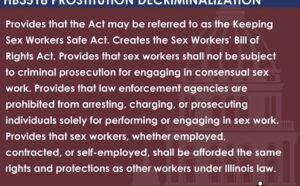Report on Public Opinion of Anti-Trade Sex Law
In 2011, the Hyundai Research Institute published the findings of a survey commissioned by the Hanteo National Union of Sex Workers. It examined “the changes in public opinions on sex trade after the enactment of the Anti-Trade Sex Law” in South Korea based on interviews with 1,000 adults from different age groups and all walks of life in a nationwide telephone survey.

“The biggest contributor to pushing sex work underground are the authorities.” A banner – previously used at the press conference by the Hanteo National Union of Sex Workers – hangs forlorn between two brothels in Yeongdeungpo, Seoul, as the red light district is closed on Korean Sex Workers’ Day 2012. (Photo by Matthias Lehmann)
Please click here to download the translated report incl. annotated tables in English. Click here, if you wish to download a scanned version of the original report in Korean.
South Korean Model: The Anti-Trade Sex Law
In September 2000, the notorious Gunsan Brothel Fire killed five women who had been held captive. Their tragic deaths exposed the conditions in Korea’s sex industry and triggered a campaign by women’s rights activists to reform the country’s prostitution laws. Their proposals became the blueprint for the Special Laws on Sex Trade (??? ???, Seongmaemae tteukbyeol beob), enacted in 2004, which include a Protection and Prevention Act and a Punishment Act, which penalises both buyers and sellers of sexual acts with up to one year in prison or fines up to 3 million won (approx. £1,715/€2,075/$2,825), except for those who were coerced into selling sex. Those who force others to sell sex are subject to up to 10 years in prison or fines of up to 100 million won (approx. £57,000/€70,000/$94,000).
The Anti-Sex Trade Law of 2004 replaced the Law Against Morally Depraved Behaviours (Prostitution) of 1961 (????????, Yullak haengui deung bangji beob). Interestingly, the new law replaced the term “prostitution” (??) with “sex trade/sex trafficking” (???) as the former was found to imply the “moral corruption of the engaged women” while the latter was deemed to be neutral in value. What this illustrates, however, is the law’s disregard of sex work as an act of self-determination and the definition of transactional sex, i.e. the receipt of monetary or other material benefits in exchange for sexual acts, as inherently exploitative.







RT @mrwhiteacre: Ineffective and in dire need of reform: South Korea’s Anti-Sex Trade Law http://t.co/Lk58z3I9fu
Gee, the Nordic Model doesn’t work in Korea either. I’m shocked, shocked I say.
New! Ineffective and in dire need of reform: South Korea’s Anti-Sex Trade Law http://t.co/Kmz8X2nTjO